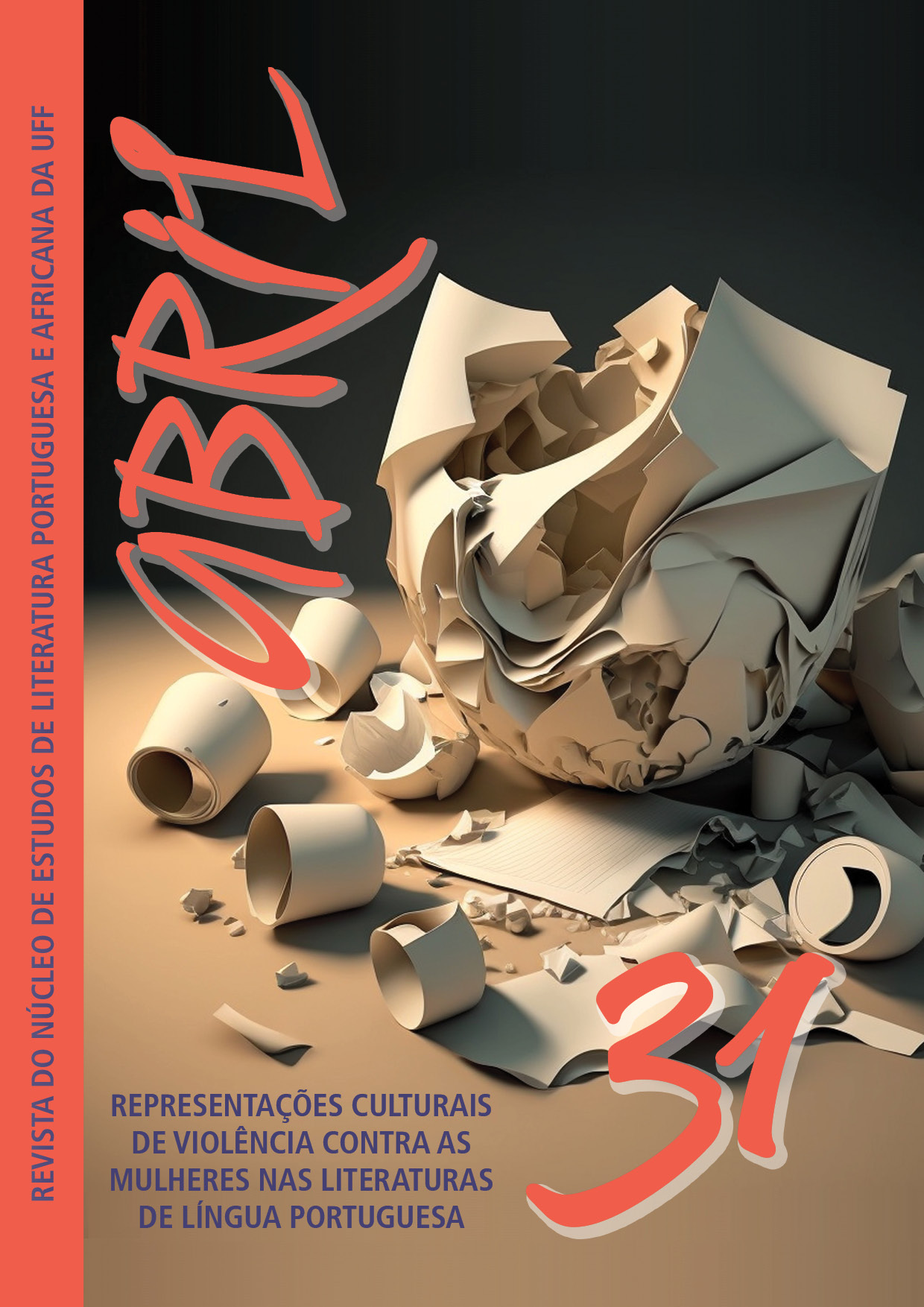Earth, body and voice as territories of r-existence[s]: a reading of Sangue Negro, by Noémia de Sousa, and the Mozambicanity project
DOI:
https://doi.org/10.22409/abriluff.v15i31.58658Keywords:
Mozambicanity project, Noemia de Sousa, Sangue Negro, TerritoriesAbstract
The literature produced in Mozambique often focuses on resuming roots and individual and collective memories prior to the colonization process, as well as criticizing this process. Thinking about this, the aim of this article is to analyze how land, voice and body are territories of re-existence[s] for subordinated peoples, such as the African, based on the reading of three poems from Sangue Negro (2016), by Noémia de Sousa, as well as the collaboration of this poetry to the Mozambicanity project. To this end, we carried out an exploratory, bibliographic and qualitative study, based on Haesbaert (2021), Secco (2016), Kilomba (2019), Ribeiro (2017), Noa (2016), Mendonça (2016), among others. From the analysis of the listed categories, it is clear that the poetry of Noémia de Sousa is an important tool for the building and enhancing the aforementioned project. Her poetry is directly engaged and, through an epic, collective and combative tone, summons her people to fight for freedom, creating poetic images that reveal African memories and ancestry.
Downloads
References
BALLESTRIN, Luciana. América Latina e o giro decolonial. In: Revista Brasileira de Ciência Política. n.11. Brasília, 2013, p. 89-117.
CUSICANQUI, Silvia Rivera. Un mundo ch’ixi es posible: ensayos sobre un presente en crisis. Buenos Aires: Tinta Limón, 2018.
FOUCAULT, Michel. História da Sexualidade II: O Uso dos Prazeres. Rio de Janeiro: Graal, 1984.
FREITAS, Sávio Roberto Fonseca de. Noémia de Sousa: Poesia combate em Moçambique. In: Cadernos Imbondeiro. João Pessoa. v.1, n.1, 2010, p. 1-13.
FREITAS, Sávio Roberto Fonseca de. Deusa D’África: uma voz feminista afro-moçambicana. In: ABRIL - Revista do Núcleo de Estudos de Literatura Portuguesa e Africana da UFF. Niterói, v.12, n.25, 2020, p. 43-53.
HAESBAERT, Rogério. Território e descolonialidade: sobre o giro (multi) territorial/de(s)colonial na “América Latina”. Ciudad Autónoma de Buenos Aires: CLASO; Niterói: Programa de Pós-Graduação em Geografia; Universidade Federal Fluminense, 2021.
KILOMBA, Grada. Memórias da plantação: Episódios do racismo cotidiano. Tradução de Jess Oliveira. Rio de Janeiro: Editora Cobogó, 2019.
MALDONADO-TORRES, Nelson. Outline of Ten Theses on Coloniality and Decoloniality, 2016. Disponível em < https://caribbeanstudiesassociation.org/docs/Maldonado-Torres_Outline_Ten_Theses-10.23.16.pdf >. Acesso em 02/02/2022.
MENDONÇA, Fátima. Moçambique, lugar para a poesia. In: Sangue Negro. São Paulo: Kapulana, 2016, p.183-192.
NGOENHA, Severino Elias. Identidade moçambicana: já e ainda não. In: Identidade, moçambicanidade, moçambicanização. Dir. Carlos César. Maputo: Universitária, 1998, p. 17-34.
NGOENHA, Severino Elias. Estatuto e axiologia da Educação. Maputo: Livraria Universitária, 2000.
NOA, Francisco. Noémia de Sousa: A metafísica do grito. In: Sangue Negro. São Paulo: Kapulana, 2016, p. 169-174.
PINHEIRO, Vanessa Neves Riambau. Entre fronteiras marítimas e corpóreas: apontamentos sobre os rumos da poesia moçambicana contemporânea. In: Revista Soletras. N.36, 2018, p. 148-165.
QUIJANO, Aníbal. Colonialidade do poder e classificação social. In: SANTOS, Boaventura de Sousa; MENESES, Maria Paula (Eds.). Epistemologias do Sul. São Paulo: Cortez, 2010.
RIBEIRO, Djamila. O que é lugar de fala?. Belo Horizonte: Letramento: Justificando, 2017.
SECCO, Carmen Lúcia Tindó. De sonhos e afetos: percursos da poesia moçambicana. In: Revista Cerrados, v. 19. N. 30. 2010, p. 143-156.
SECCO, Carmen Lúcia Tindó. Noémia de Sousa, grande dama da poesia moçambicana. In: Sangue Negro. São Paulo: Kapulana, 2016, p. 11-18.
SOUSA, Noémia de. Sangue Negro. São Paulo Kapulana, 2016.
Downloads
Published
How to Cite
Issue
Section
License
Copyright (c) 2023 ABRIL – NEPA / UFF

This work is licensed under a Creative Commons Attribution-NonCommercial 4.0 International License.
I authorize the journal Abril - NEPA/UFF to publish the paper of my authorship/responsibility that I now submit, in case it is accepted for online publication.
Moreover, I declare that this contribution is original, that it was not submitted to any other editor for publication, and I sign the present declaration attesting the truth of all its contents.
The copyright of the works published at the virtual space of the journal Abril - NEPA/UFF are automatically entitled to the journal. Their total or partial reproduction is conditioned to the authors' citations and publication data.

Abril is licensed under a Creative Commons - Attribution-NonCommercial 4.0 International (CC BY-NC 4.0).









